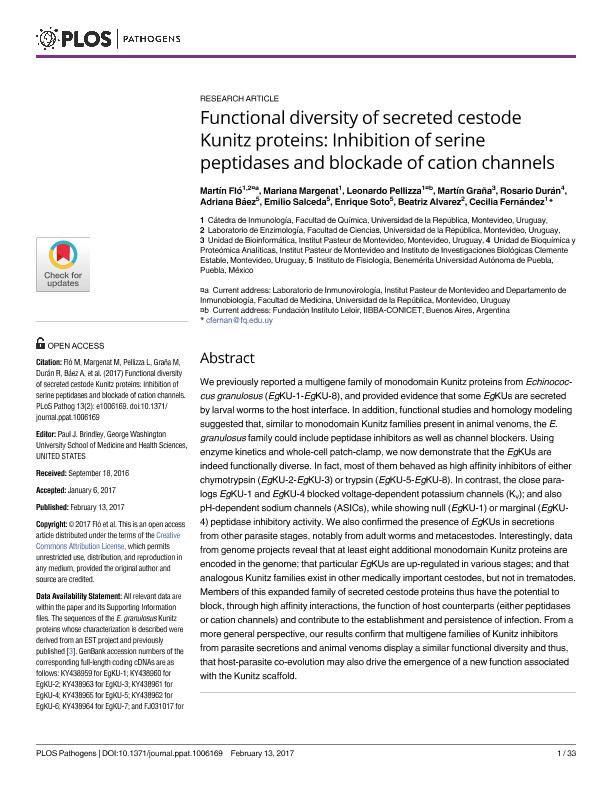Mostrar el registro sencillo del ítem
dc.contributor.author
Fló, Martín
dc.contributor.author
Margenat, Mariana
dc.contributor.author
Pellizza Pena, Leonardo Agustín

dc.contributor.author
Graña, Martín
dc.contributor.author
Durán, Rosario
dc.contributor.author
Báez, Adriana
dc.contributor.author
Salceda, Emilio
dc.contributor.author
Soto, Enrique
dc.contributor.author
Alvarez, Beatriz
dc.contributor.author
Fernández, Cecilia
dc.date.available
2017-09-26T16:22:14Z
dc.date.issued
2017-02
dc.identifier.citation
Fló, Martín; Margenat, Mariana; Pellizza Pena, Leonardo Agustín; Graña, Martín; Durán, Rosario; et al.; Functional diversity of secreted cestode Kunitz proteins: Inhibition of serine peptidases and blockade of cation channels; Public Library of Science; Plos Pathogens; 13; 2; 2-2017; 1-33; e1006169
dc.identifier.issn
1553-7366
dc.identifier.uri
http://hdl.handle.net/11336/25121
dc.description.abstract
We previously reported a multigene family of monodomain Kunitz proteins from Echinococcus granulosus (EgKU-1-EgKU-8), and provided evidence that some EgKUs are secreted by larval worms to the host interface. In addition, functional studies and homology modeling suggested that, similar to monodomain Kunitz families present in animal venoms, the E. granulosus family could include peptidase inhibitors as well as channel blockers. Using enzyme kinetics and whole-cell patch-clamp, we now demonstrate that the EgKUs are indeed functionally diverse. In fact, most of them behaved as high affinity inhibitors of either chymotrypsin (EgKU-2-EgKU-3) or trypsin (EgKU-5-EgKU-8). In contrast, the close paralogs EgKU-1 and EgKU-4 blocked voltage-dependent potassium channels (Kv); and also pH-dependent sodium channels (ASICs), while showing null (EgKU-1) or marginal (EgKU-4) peptidase inhibitory activity. We also confirmed the presence of EgKUs in secretions from other parasite stages, notably from adult worms and metacestodes. Interestingly, data from genome projects reveal that at least eight additional monodomain Kunitz proteins are encoded in the genome; that particular EgKUs are up-regulated in various stages; and that analogous Kunitz families exist in other medically important cestodes, but not in trematodes. Members of this expanded family of secreted cestode proteins thus have the potential to block, through high affinity interactions, the function of host counterparts (either peptidases or cation channels) and contribute to the establishment and persistence of infection. From a more general perspective, our results confirm that multigene families of Kunitz inhibitors from parasite secretions and animal venoms display a similar functional diversity and thus, that host-parasite co-evolution may also drive the emergence of a new function associated with the Kunitz scaffold.
dc.format
application/pdf
dc.language.iso
eng
dc.publisher
Public Library of Science

dc.rights
info:eu-repo/semantics/openAccess
dc.rights.uri
https://creativecommons.org/licenses/by-nc-sa/2.5/ar/
dc.subject
Kunitz
dc.subject
Proteins
dc.subject
E.Granulosus
dc.subject.classification
Bioquímica y Biología Molecular

dc.subject.classification
Ciencias Biológicas

dc.subject.classification
CIENCIAS NATURALES Y EXACTAS

dc.title
Functional diversity of secreted cestode Kunitz proteins: Inhibition of serine peptidases and blockade of cation channels
dc.type
info:eu-repo/semantics/article
dc.type
info:ar-repo/semantics/artículo
dc.type
info:eu-repo/semantics/publishedVersion
dc.date.updated
2017-09-08T20:11:58Z
dc.identifier.eissn
1553-7374
dc.journal.volume
13
dc.journal.number
2
dc.journal.pagination
1-33; e1006169
dc.journal.pais
Estados Unidos

dc.journal.ciudad
San Francisco
dc.description.fil
Fil: Fló, Martín. Universidad de la República; Uruguay
dc.description.fil
Fil: Margenat, Mariana. Universidad de la República; Uruguay
dc.description.fil
Fil: Pellizza Pena, Leonardo Agustín. Consejo Nacional de Investigaciones Científicas y Técnicas. Oficina de Coordinación Administrativa Parque Centenario. Instituto de Investigaciones Bioquímicas de Buenos Aires. Fundación Instituto Leloir. Instituto de Investigaciones Bioquímicas de Buenos Aires; Argentina. Universidad de la República; Uruguay
dc.description.fil
Fil: Graña, Martín. Instituto Pasteur de Montevideo; Uruguay
dc.description.fil
Fil: Durán, Rosario. Instituto Pasteur de Montevideo; Uruguay
dc.description.fil
Fil: Báez, Adriana. Benemérita Universidad Autónoma de Puebla; México
dc.description.fil
Fil: Salceda, Emilio. Benemérita Universidad Autónoma de Puebla; México
dc.description.fil
Fil: Soto, Enrique. Benemérita Universidad Autónoma de Puebla; México
dc.description.fil
Fil: Alvarez, Beatriz. Universidad de la República; Uruguay
dc.description.fil
Fil: Fernández, Cecilia. Universidad de la República; Uruguay
dc.journal.title
Plos Pathogens

dc.relation.alternativeid
info:eu-repo/semantics/altIdentifier/url/http://journals.plos.org/plospathogens/article?id=10.1371/journal.ppat.1006169
dc.relation.alternativeid
info:eu-repo/semantics/altIdentifier/doi/http://dx.doi.org/10.1371/journal.ppat.1006169
Archivos asociados
